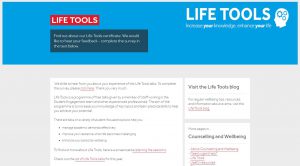The Life Tools programme is a psycho-educational training programme,  developed over the past 16 years at Reading. It focuses on providing students with the resources to manage the transition into university as well as manage the demands of their academic studies and prepare them for life beyond university.
developed over the past 16 years at Reading. It focuses on providing students with the resources to manage the transition into university as well as manage the demands of their academic studies and prepare them for life beyond university.
Watch a video introducing the Life Tools Programme on YouTube.
The programme’s framework is based on positive psychology principles (Seligman & Csikszentmihalyi, 2000), development of a growth mindset (Dweck, 2017) and using solution focused approaches to strengthen a positive attitude towards learning and promote the development of resilience. The programme consists of a series of research-based presentations on a variety of topics related to strengthening cognitive abilities, emotional self-regulation, enhancing self-awareness and promoting confidence in their ability to self-manage.
The aim is to expand the provision into departments by providing bespoke training to meet the needs of different cohorts and degree programmes. Colleagues who are interested can make contact to discuss details to develop a bespoke programme for their department.
The overarching goal is to develop resilient graduates who can make a positive contribution when they go into the workplace and have a meaningful and rewarding life.
The way of working is collaborative with the aim of providing a seamless network of support and resources for students. Therefore, joint presentations have been designed and delivered in collaboration with colleagues from the Study Advice and Careers teams.
Some samples of the comments given by students:
“They really helped give practical advice on how to be more organised, motivated, and to do well, not just at uni, but at just getting things done, and feeling more productive. They helped me to always feel like aIways was working on improving myself, not just improving academically.” (Presentation on managing academic pressure)
“It is a great way to help with problems to get work done, changes your way of thinking about
procrastination. I know now what to do, I have positive thoughts about getting work done.” (Presentation on Ways to stop procrastination)
Life Tools have also produced a series of bite-size videos (<2 minutes) on a variety of topics. Students can access this via the Life Tools Blackboard organisation or Instagram.
1.Life Tools Blackboard organisation (Students can enrol by following the links on the Life Tools homepage)
The aim of the Blackboard organisation is to make the programme, and its resources, more accessible to students. The organisation is available to all students, and they can self-enrol to facilitate their access. The added benefit is that students who are not able to attend the presentations due to a busy timetable can still have access to the material.
Modules are being created where students can find resources related to the topics covered in the presentations. Each module covers a specific topic, and it includes a screencast, worksheets, and links to other resources (such as Study advice guides, and Counselling and Wellbeing leaflets).
- Life Tools blog:
The Life Tools blog started at the end of February 2017, with the aim of providing online resources for students who may not been able to attend the presentations, or who wished to have more information related to the topics covered in the presentations. The topics covered are aligned with the student’s journey during the academic year. For example, at the beginning of the academic year the topics are on managing transitions, making social connections. As the year progresses the topics covered are on managing academic pressure, ways of dealing with procrastination, increasing concentration, maintaining motivation and productivity, and others.
- Life Tools certificate:
Attending Life Tools presentations already counts towards the RED Award, which they already engage with well. The certificate is taking one further step as a means of recognising their dedication to a more in-depth focus on personal development. It was designed with a view to encourage students to focus on building resilience, engage in the development of their skills and promote a professionals-in-training attitude aligned with their educational goals.
